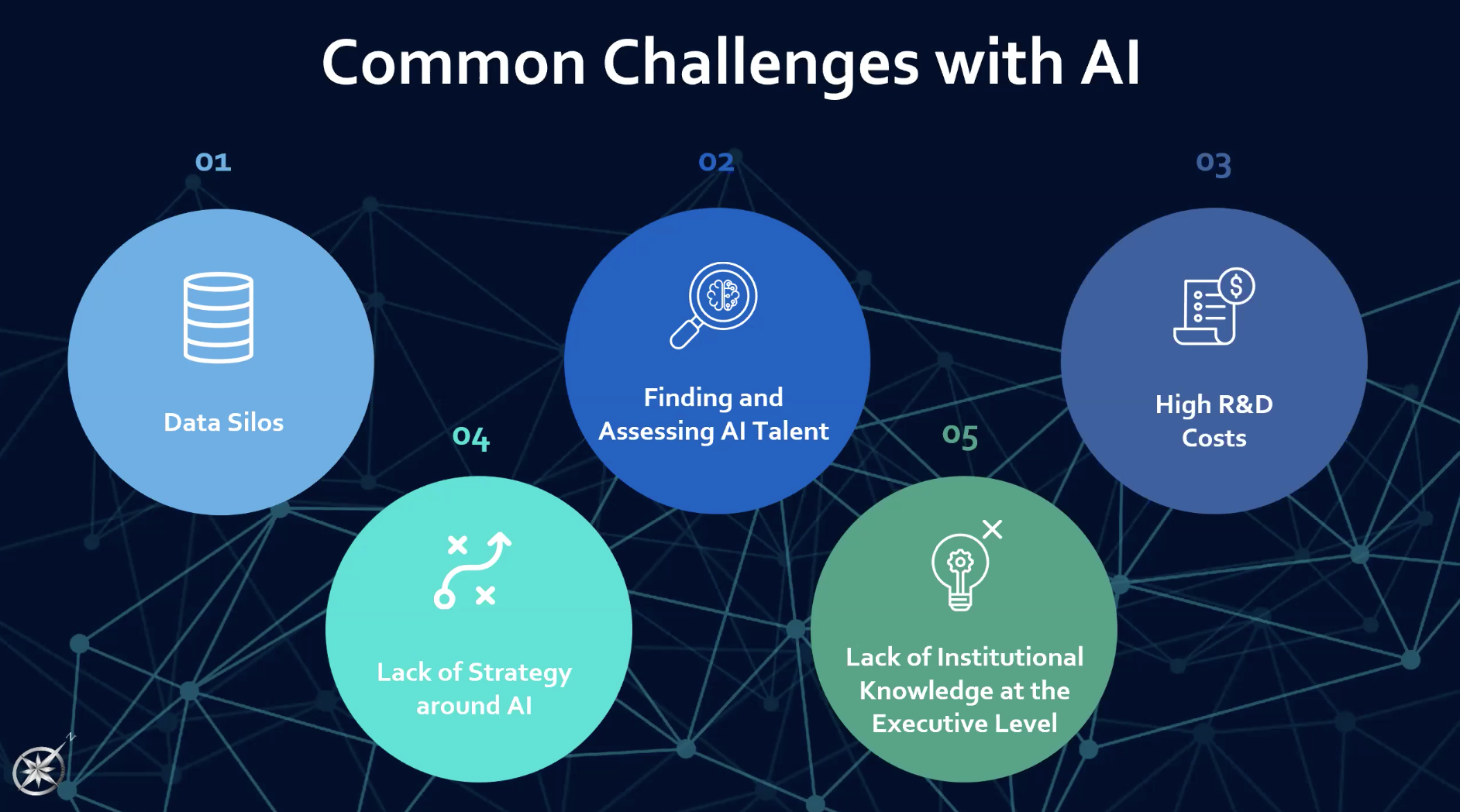Overcoming the Challenges of Implementing AI in Healthcare

The integration of Artificial Intelligence (AI) into healthcare holds immense promise for transforming patient care, improving efficiency, and reducing costs. However, its implementation is not without challenges. Here are some key hurdles and practical strategies to overcome them:

1. Data Quality and Security:

- Challenge: AI algorithms rely heavily on high-quality data for accurate predictions and insights. Healthcare data is often fragmented, incomplete, or inconsistent, making it difficult to train AI models effectively.
- Strategy: Implement rigorous data governance policies, ensure data standardization and harmonization, and invest in data cleaning and annotation tools to improve data quality. Additionally, employ robust cybersecurity measures to protect patient data privacy.
2. Regulatory Compliance:
- Challenge: Healthcare data is subject to various regulations, such as HIPAA in the United States and GDPR in Europe. AI algorithms must comply with these regulations to protect patient privacy and prevent unauthorized data access.
- Strategy: Collaborate with legal and compliance experts to ensure AI systems align with regulatory requirements. Implement data anonymization techniques and minimize the collection of sensitive patient information.
3. Trust and Acceptance:
- Challenge: Healthcare professionals and patients need to trust AI systems before they can adopt them. There are concerns about the reliability, transparency, and algorithmic bias of AI algorithms.
- Strategy: Engage with stakeholders early on, provide clear documentation and explanations of AI workings, and demonstrate the benefits and limitations of the system. Promote transparency and accountability by providing audit trails and allowing users to question AI decisions.
4. Lack of Expertise:
- Challenge: Developing and implementing AI solutions requires specialized knowledge and expertise in both healthcare and AI. Healthcare organizations may lack the in-house capabilities to effectively implement AI systems.
- Strategy: Partner with AI vendors or consulting firms that provide expertise in healthcare-specific AI solutions. Cross-train staff to bridge the knowledge gap between healthcare and technology.
5. Integration with Existing Systems:
- Challenge: Integrating AI systems with existing healthcare information systems can be complex and time-consuming. Legacy systems may not be compatible with modern AI algorithms, hindering data exchange and seamless workflow.
- Strategy: Conduct a comprehensive evaluation of existing systems and identify areas of compatibility. Invest in data integration platforms and specialized middleware to facilitate seamless interoperability between AI systems and healthcare infrastructure.
By addressing these challenges strategically, healthcare organizations can overcome the barriers to AI implementation and harness its transformative potential to improve patient outcomes, enhance operational efficiency, and reduce the overall cost of care.## Overcoming The Challenges Of Implementing AI In Healthcare
Executive Summary
Artificial Intelligence (AI) has the potential to revolutionize healthcare by improving efficiency, accuracy, and patient care. However, implementing AI in healthcare presents significant challenges. This article identifies the key challenges and provides practical recommendations for overcoming them. By addressing these challenges, healthcare organizations can harness the full potential of AI to improve patient outcomes and transform healthcare delivery.
Introduction
AI is rapidly transforming various industries, and healthcare is no exception. From image analysis to disease diagnosis and drug discovery, AI has the potential to automate tasks, improve decision-making, and enhance patient experiences. However, implementing AI in healthcare poses unique challenges that require careful consideration.
FAQs
1. What are the biggest challenges to implementing AI in healthcare?
- Data privacy and security concerns
- Lack of trained professionals
- Integration with existing systems
2. How can healthcare organizations overcome these challenges?
- Implement robust data governance practices
- Invest in training and education
- Collaborate with technology providers
3. What are the benefits of implementing AI in healthcare?
- Improved efficiency and accuracy
- Personalized and proactive patient care
- Reduced costs and increased access to care
Top 5 Subtopics for Implementing AI in Healthcare
Data Governance and Security
- Data privacy: Ensuring the privacy and security of patient data is paramount when implementing AI in healthcare. Implementing robust data governance practices, such as data encryption, access controls, and regular audits, is essential to mitigate risks.
- Data interoperability: Healthcare data is often fragmented across different systems. Interoperability standards and data sharing agreements enable AI applications to access and analyze data from multiple sources, providing a more comprehensive view of patient health.
- Data quality: AI algorithms are only as good as the data they are trained on. Ensuring data accuracy and completeness through data cleaning, validation, and standardization is crucial for effective AI implementation.
AI Education and Training
- Building a skilled workforce: Healthcare professionals need to be educated and trained on the fundamentals of AI and its applications in healthcare. This involves understanding AI algorithms, data analysis techniques, and the ethical considerations of AI implementation.
- Upskilling existing staff: Organizations can invest in upskilling current employees to fill the gap in AI expertise. This includes providing training on AI tools, data analysis, and programming skills.
- Collaboration with universities: Partnerships with universities and research institutions can provide access to specialized AI training programs and foster innovation in healthcare AI.
Integration with Existing Systems
- Interoperability with legacy systems: Existing healthcare systems, such as electronic health records (EHRs) and medical devices, need to be integrated with AI applications. This requires the development of standardized interfaces, data mapping, and integration testing.
- Vendor compatibility: When selecting AI solutions, healthcare organizations should consider their compatibility with existing systems. Choosing vendors that offer seamless integration can reduce implementation costs and improve efficiency.
- Scalability and performance: AI applications must be scalable to handle increasing data volumes and meet the performance requirements of healthcare environments. Organizations should evaluate the scalability and performance capabilities of AI solutions before implementation.
Ethical and Regulatory Considerations
- Patient consent: Obtaining informed patient consent is essential when collecting and using patient data for AI training and applications. Transparent and clear communication about data usage and privacy considerations is crucial.
- Transparency and accountability: AI algorithms should be transparent and accountable. Healthcare organizations need to ensure that AI decisions are explainable, auditable, and aligned with ethical guidelines.
- Regulatory compliance: AI implementation must adhere to regulatory requirements and industry standards. Organizations should stay informed about evolving regulations and best practices related to AI in healthcare.
Cost and Return on Investment
- Cost of implementation: AI implementation can involve significant costs, including hardware, software, data infrastructure, and training. Organizations should carefully evaluate the costs and potential return on investment before implementing AI solutions.
- Value-based care: AI can contribute to value-based care models by improving efficiency, reducing costs, and enhancing patient outcomes. Quantifying the value of AI implementation through metrics such as improved patient care, reduced readmissions, and cost savings is essential for demonstrating return on investment.
- Long-term sustainability: Sustainable AI implementation requires ongoing investment in maintenance, upgrades, and workforce training. Organizations should consider the long-term costs of AI and develop sustainable funding models.
Conclusion
Implementing AI in healthcare presents challenges, but also immense opportunities to improve patient care and transform healthcare delivery. By addressing the challenges discussed in this article, such as data governance, AI education, system integration, ethical considerations, and cost optimization, healthcare organizations can harness the full potential of AI. By doing so, they can improve data-driven decision-making, personalize patient experiences, and drive innovation in the healthcare sector.
Relevant Keyword Tags
- AI in Healthcare
- Data Governance
- AI Education
- System Integration
- Ethical AI Implementation
